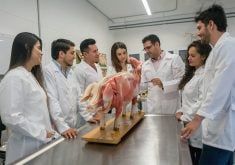This year’s Saskatchewan Herb and Spice Association conference was all about business.
The theme came out of a survey of association members, who said they knew about agrology, research and crops, and now wanted to know how to sell what they produce.
“We were surprised when people said they wanted help developing the business,” executive director Connie Kehler said in an interview during the conference.
“We need mentors. We need people who have had experience … some of that old wisdom.”
The wisdom of those who have failed was a common theme at the podium, Kehler said.
Read Also

Fuel rebate rule change will affect taxes and AgriStability
The federal government recently announced updates to the fuel rebates that farmers have been receiving since 2019-20.
Keynote speaker and former television celebrity Dini Petty spoke of how she had learned to trust her gut instinct after she failed several times. Health food store entrepreneur Ray Sangster challenged the growers to imagine what they could do if they weren’t afraid.
Kehler said experience works. The people who have been in the herb and spice industry the longest are the most profitable, she said. That experience is building, with the association growing to 300 members from 10 in 1992.
She picked culinary herbs, organic spices and possibly medicinal herbs as crops that might work in the future.
Speaker Rod Gray, of the $35-million-a-year California company Spice Hunter, said his firm is looking at a consumer trend to buy food that is healthy as well as convenient. In response to customer comments about the company’s “all natural” lines of dried pastas, soups and spices, the products are sterilized by steam or heat, rather than radiation or chemicals.
Gray said that as a herb buyer, he wants growers to produce large crops of consistent quality and taste and to ensure him they will be there for years to come.
Joan Harrison, who represents consumers on the Saskatchewan Organic Directorate board, said rural producers need to be aware of urban consumers’ preferences since that is their market. But often, organic products in prairie stores are not locally produced.
“(Organic) certification is about a disconnect between the producer and consumer, the trust.”
Debbie Claude, co-ordinator of the Saskatoon Farmers’ Market, said farmers’ markets are one way to link with consumers. She said direct sales that bring growers and consumers face to face work best for small and medium-sized farmers.
“Herbs are more popular as the consumer is educated, a widening of the palate,” Claude said.














